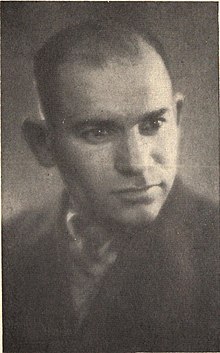fiction.wikisort.org - Writer
Leyzer Volf (Yiddish: לייזער וואָלף; born Eliezer Mekler; 1910, in Šnipiškės, Vilnius – April 1943, in Shakhrisabz) was a Yiddish poet and writer of the Yung-Vilne movement, best remembered for his poems Black Pearls (1939), Lyric and satire (1940), and Brown Beast (1943).[2][3][4][5]
This article may be expanded with text translated from the corresponding article in Yiddish. (March 2022) Click [show] for important translation instructions.
|
This article may be expanded with text translated from the corresponding article in Russian. Click [show] for important translation instructions.
|
Leyzer Volf | |
|---|---|
 | |
| Native name | לייזער וואלף |
| Born | Eliezer Mekler 1910 Šnipiškės, Vilnius, Vilnius Governorate, Russian Empire (present-day Lithuania) |
| Died | 1944 (aged 33–34) Shakhrisabz, Uzbek SSR (present-day Uzbekistan)[1] |
| Occupation | Poet, writer |
| Language | Yiddish |
| Nationality | Russian |
Biography
Volf's father was a house painter and his mother was a housewife.[6] He was the fourth child in his family.[6] He was sent to cheder at age four, but quickly left after being shocked by the way the rabbi treated the children, after which he was taught privately at home by a melamed.[6] Later on he would study at a secular Jewish folk school in Vilnius and attend a youth camp for weak children; throughout this period he kept a large distance from other children and did not have many friends.[6] Already in school he was considered to be an excellent writer and an avid reader.[6]
References
- Wasserstein, Bernard (3 May 2012). On The Eve: The Jews of Europe before the Second World War. Profile. p. 461. ISBN 978-1-84765-345-1.
- "Leyzer Wolf". Yiddishkayt. Retrieved 15 March 2022.
- "YIVO | Volf, Leyzer". yivoencyclopedia.org. Retrieved 15 March 2022.
- Cernakova, Viktorija (28 February 2022). "Leyzer Volf (12.01.1910, Vilna - ?.04.1943, near Samarkand, now Uzbekistan)". WJC Yiddish Center. Retrieved 15 March 2022.
- "Teaching Guide for Leyzer Volf's Evigingo (trans. Finkin)". In geveb.
- שלמה, בעליס (1964). פארטרעטן און פראבלעמן. Warsaw: ייִדיש-בוך. p. 118.
На других языках
- [en] Leyzer Volf
[ru] Вольф, Лейзер Менделевич
Лейзер Вольф (идиш לײזער װאָלף, настоящее имя Лейзер Менделевич Меклер; 12 января 1909, Вильна, Российская империя — 1943, близ Самарканда, СССР) — еврейский поэт, прозаик, один из основателей литературной группы «Юнг Вилне»[1], сторонник территориализма[2]. Писал на идише.Другой контент может иметь иную лицензию. Перед использованием материалов сайта WikiSort.org внимательно изучите правила лицензирования конкретных элементов наполнения сайта.
WikiSort.org - проект по пересортировке и дополнению контента Википедии